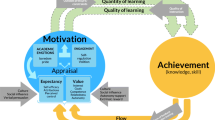Abstract
This special issue was organized with the intent to highlight critical research being conducted on affect in education as well as to highlight potential areas for future research. Each of the manuscripts included in this special issue focuses on the contributing authors’ program of research, with an emphasis on the theoretical basis for their work and the methodologies they employ. The authors also consider how to integrate affect, motivation, and cognition and discuss methodological challenges to investigating affect in educational settings. Finally, the authors consider the role of affect in education, making specific suggestions for practice as well as more general suggestions for theory development.
Similar content being viewed by others
Notes
Throughout the introduction, I use the term ‘affect’ to refer to affective states generally, which include both moods and emotions.
Terms such as ‘temperament’ and ‘feeling’ are also used, but to a lesser extent.
References
Atkinson, J. W. (1964). An introduction to motivation. Princeton, N.J.: Van Nostrand.
Bless, H. (2000). The interplay of affect and cognition: The mediating role of general knowledge structures. In J. P. Forgas (Ed.), Feeling and thinking: The role of affect in social cognition (pp. 201–222). Paris: Cambridge University Press.
Boekaerts, M. (1993). Being concerned with well-being and with learning. Educational Psychologist, 28, 149–167.
Bower, G. (1981). Mood and memory. American Psychologist, 36, 129–148.
Dalgleish, T., & Power, M. J. (1999). Cognition and emotion: Future directions. In T. Dalgleish & M. Power (Eds.), Handbook of cognition and emotion (pp. 799–805). Chichester, England: Wiley.
Efklides, A., & Volet, S. (2005). Emotional experiences during learning: Multiple, situated and dynamic. Learning and Instruction, 15, 377–380.
Ellis, H. C., & Ashbrook, P. W. (1988). Resource allocation model of the effects of depressed mood states on memory. In K. Fiedler & J. Forgas (Eds.), Affect, cognition, and social behavior: New evidence and integrative attempts (pp. 25–43). Toronto: C. J. Hogrefe.
Feldman Barrett, L., & Russell, J. A. (1999). The structure of current affect: Controversies and emerging consensus. Current Directions in Psychological Science, 8, 10–14.
Ford, M. E. (1992). Motivating humans: Goals, emotions, and personal agency beliefs. Newbury Park, CA: Sage.
Forgas, J. P. (2000a). Affect and information processing strategies: An interactive relationship. In J. P. Forgas (Ed.), Feeling and thinking: The role of affect in social cognition (pp. 253–280). Paris: Cambridge University Press.
Forgas, J. P. (2000b). Feeling and thinking: Summary and integration. In J. P. Forgas (Ed.), Feeling and thinking: The role of affect in social cognition (pp. 387–406). Paris: Cambridge University Press.
Fredrickson, B. L. (1998). What good are positive emotions? Review of General Psychology, 2, 300–319.
Frijda, N. H. (1988). The laws of emotions. American Psychologist, 43(5), 349–358.
Lazarus, R. S. (1999). Stress and emotions: A new synthesis. Berlin Heidelberg New York: Springer.
Lewis, M. D. (2000). Emotional self-organization at three time scales. In M. D. Lewis & I. Granic (Eds.), Emotion, development, and self-organization: Dynamic systems approaches to emotional development. (pp. 37–69). Cambridge, UK: Cambridge University Press.
Murphy, P. K., & Alexander, P. A. (2000). A motivated exploration of motivation terminology. Contemporary Educational Psychology, 25, 3–53.
Pekrun, R. (1992). The impact of emotion on learning and achievement: Towards a theory of cognitive/motivational mediators. Applied Psychology, 41, 359–376.
Pekrun, R., Goetz, T., Titz, W., & Perry, R. P. (2002). Academic emotions in students’ self-regulated learning and achievement: A program of qualitative and quantitative research. Educational Psychologist, 37, 91–106.
Pintrich, P. R., Marx, R., & Boyle, R. (1993). Beyond cold conceptual change: The role of motivational beliefs and classroom contextual factors in the process of conceptual change. Review of Educational Research, 63, 167–199.
Rosenberg, E. L. (1998). Levels of analysis and the organization of affect. Review of General Psychology 2(3), 247–270.
Scherer, K. R. (1999). Appraisal theory. In T. Dalgleish & M. Power (Eds.), Handbook of cognition and emotion (pp. 637–663). Chichester, England: Wiley.
Schutz, P. A., & DeCuir, J. T. (2002). Inquiry on emotions in education. Educational Psychologist, 37, 125–135.
Schutz, P. A., & Pekrun, R. (in press). Emotions in education. Academic Press.
Schwarz, N. (1990). Feelings as information: Informational and motivational functions of affective states. In E. T. Higgins & R. M. Sorrentino (Eds.), Handbook of motivation and cognition: Foundations of social behavior, vol. 2 (pp. 527–561). New York: Guilford.
Schwarz, N., & Clore, G. L. (1996). Feelings and phenomenal experiences. In E. T. Higgins & A. W. Kruglanski (Eds.), Social psychology: Handbook of basic principles (pp. 433–465). New York: Guilford.
Smith, C. A., & Lazarus, R. S. (1990). Emotion and adaptation. In L. A. Pervin (Ed.), Handbook of personality: Theory and research (pp. 609–637). New York, NY, US: Guilford.
Tellegen, A., Watson, D., & Clark, L. A. (1999). On the dimensional and hierarchical structure of affect. Psychological Science, 10, 297–309.
Weiner, B. (1985). An attributional theory of achievement motivation and emotion. Psychological Review, 92, 548–573.
Author information
Authors and Affiliations
Corresponding author
Rights and permissions
About this article
Cite this article
Linnenbrink, E.A. Emotion Research in Education: Theoretical and Methodological Perspectives on the Integration of Affect, Motivation, and Cognition. Educ Psychol Rev 18, 307–314 (2006). https://doi.org/10.1007/s10648-006-9028-x
Published:
Issue Date:
DOI: https://doi.org/10.1007/s10648-006-9028-x




